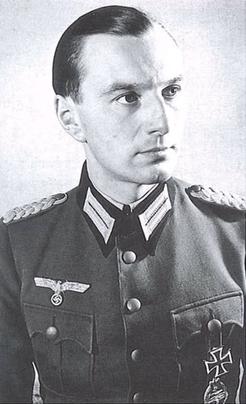
Alexander Otto Hermann Wolfgang Bernd(t) Freiherr Freytag von Loringhoven, was a Baltic German officer in the German Army during World War II. In 1956, he joined the German Federal Armed Forces, the Bundeswehr, and rose to the rank of Generalleutnant.

Frederick Philip Grove was a German-born Canadian novelist and translator.
Freytag is a German surname, meaning Friday. Notable people with the surname include:
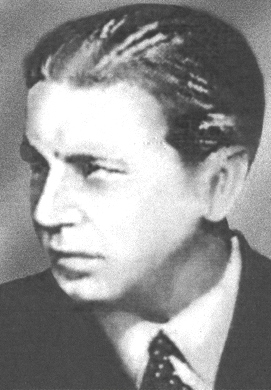
Rudolf "Dolf" von Scheliha was a German aristocrat, cavalry officer and diplomat who became a resistance fighter and anti-Nazi who was linked to the Red Orchestra.
Wessel Oskar Karl Johann Freiherr Freytag von Loringhoven, was a Baltic German colonel in the High Command of the German Armed Forces (OKW) and a member of the German Resistance (Widerstand) against Adolf Hitler. Loringhoven was a friend of Claus von Stauffenberg, who was the leader of the 20 July Plot to assassinate Hitler in 1944.

Elsa Baroness von Freytag-Loringhoven was a German-born avant-garde visual artist and poet, who was active in Greenwich Village, New York, from 1913 to 1923, where her radical self-displays came to embody a living Dada. She was considered one of the most controversial and radical women artists of the era.
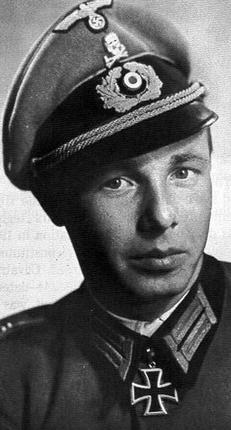
Gerhard Boldt was an officer in the German Army (Heer) who wrote about his experiences during World War II.

The Freytag von Loringhoven is a German noble family that originated in Westphalia. It was an Uradel family whose name is also spelled as Vrydach, Frydag, Freydag and various other slightly different spellings.

Official relations between Poland and the United States on a diplomatic level were initiated in 1919 after Poland had established itself as a republic after 123 years of being under foreign rule from the Partitions of Poland. However, ties with the United States date back to the 17th century, when the Polish–Lithuanian Commonwealth was one of Europe's largest powers, and many Poles immigrated to the Thirteen Colonies. During the American Revolutionary War, the Polish military commanders Tadeusz Kościuszko and Casimir Pułaski contributed greatly to the Patriot cause, with Kościuszko becoming a national hero in America. Since 1989, Polish–American relations have been strong and Poland is one of the chief European allies of the United States, being part of both NATO and the European Union. There is a strong cultural appreciation between the two nations (Polonophilia). According to the US Department of State, Poland remains a "stalwart ally" and "one of strongest Continental partners in fostering security and prosperity, throughout Europe and the world." Poland was also one of four participating countries in the American-led Iraq War coalition in 2003.
Events in the year 2007 in Germany.

Germany–Ukraine relations are foreign relations between Germany and Ukraine. Diplomatic relations between Ukraine and Germany originally were established in 1918 as between Ukrainian People's Republic and German Empire, but were discontinued soon thereafter due to occupation of Ukraine by the Red Army. Current relations were resumed in 1989 at a consulate level, and in 1992 as full-scale diplomatic mission. Germany supports Ukraine's European Union and NATO membership, and helps it to grow a "strong, climate-friendly economy".

Poland–Russia relations have a long and often turbulent history, dating to the late Middle Ages, when the Kingdom of Poland and Kievan Rus' and later the Grand Duchy of Moscow struggled over control of their borders. Over centuries, there have been several Polish–Russian Wars, with Poland once occupying Moscow and later Russia controlling much of Poland in the 19th as well as in the 20th century, leading to strained relations and multiple Polish attempts at re-acquiring independence. Polish–Russian relations entered a new phase following the fall of communism, 1989–1993, with relations warming under Soviet Premier Mikhail Gorbachev and later Russian President Boris Yeltsin. Relations began worsening considerably as a result of the 2008 Russian invasion of Georgia, and later the 2014 annexation of Crimea and especially the 2022 Russian invasion of Ukraine. Relations between the Polish and Russian governments have become extremely unfriendly, and according to a 2022 poll, only 2% of Poles view Russia positively, the lowest number in the world among countries polled.
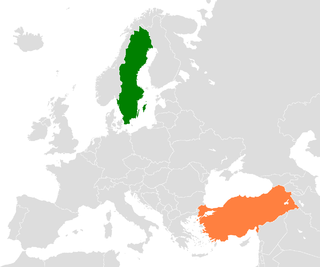
Swedish–Turkish relations are foreign relations between Sweden and Turkey. Both countries are full members of the Council of Europe, the Organisation for Economic Co-operation and Development (OECD), the Organization for Security and Co-operation in Europe (OSCE) and the Union for the Mediterranean.
Rudolf Weiß was a German officer appointed personal adjutant for the Army's Personnel Department Chief, a position he held until the end of World War II. Further, he was stationed in the Führerbunker in April 1945.

Hugo Friedrich Philipp Johann Freiherr von Freytag-Loringhoven was a Prussian general and a writer on military matters, being awarded the Pour le Mérite in 1916 for his work as a historian.

The Frydag family, also spelled Vrydach, Freytag, Freydag and various other slightly different spellings, is a German noble family known since the beginning of the 14th century that originated in Uradel in Westphalia.

Adam Norbert Hałaciński is a Polish diplomat who was ambassador to Sweden from 2010 to 2014 and is currently serving as permanent representative to the Organization for Security and Co-operation in Europe.
Richard Townsend Davies was an American diplomat who served as the United States Ambassador to Poland from 1973 to 1978.
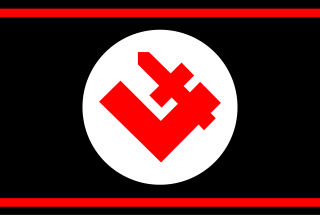
Falanga is a Polish national radical organization founded in January 2009. The former coordinator of the Masovian Brigade of the National Radical Camp (ONR), Bartosz Bekier, leads it.














